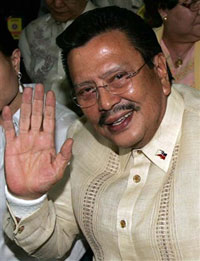Ousted Philippine president says prison terms for Filipino and co-accused in US spy ploy harsh
The prison terms meted out by a U.S. court to two men for illegally obtaining secret U.S. documents about the Philippines were harsh, considering the information was worthless, ousted President Joseph Estrada said Thursday.

Former Philippine police officer Michael Ray Aquino was sentenced Tuesday to six years and four months in prison for his role in an effort to use the information to undermine the government of Estrada's rival, President Gloria Macapagal Arroyo.
A co-accused, Leandro Aragoncillo, a naturalized American and former FBI intelligence analyst who worked under two U.S. vice presidents, was sentenced Wednesday to 10 years.
Estrada said the documents obtained by Aquino and Aragoncillo, some of which he received by e-mail, contained information that has appeared in newspapers and were nowhere near classified.
"It's very harsh," he said of the sentences.
"How can information that has been read by so many in newspapers be considered classified?" Estrada told The Associated Press by telephone from his suburban Manila villa, where he is awaiting a verdict in his plunder trial.
Estrada said the two men were his friends but had no political motive for getting the information.
U.S. prosecutors once visited him in detention and he said he told them the same. Estrada said he even showed some of the e-mailed U.S. documents to Arroyo's emissaries to stress the information was worthless.
Estrada laughed off insinuations by Justice Secretary Raul Gonzales that he and other politicians who received the U.S. documents may have committed crimes, possibly sedition.
Gonzales said he asked U.S. Attorney General Alberto Gonzales - via the American Embassy in Manila - to furnish Manila with the evidence used to convict Aquino, in a bid to identify local politicians who may have acted with him. He refused to speculate on their identities.
U.S. court documents have identified Estrada, opposition Sen. Panfilo Lacson and former House of Representatives Speaker Arnulfo Fuentebella as among those who received the documents.
Estrada dismissed speculation that two men's efforts were part of a plot to topple Arroyo, who took power after he was ousted by a 2001 "people power" revolt over corruption allegations.
Estrada has said the documents contained harmless information, mostly unflattering assessments of politicians, such as Arroyo, which were widely reported in the Philippine media.
Still, U.S. District Judge William H. Walls said Aquino "did subject our nation to some peril."
American prosecutors said Aquino posed a "danger to the national security, including the foreign relations, of the United States" by attempting to destabilize and overthrow Arroyo.
The classified documents were taken from the White House and the FBI.
Subscribe to Pravda.Ru Telegram channel, Facebook, RSS!

